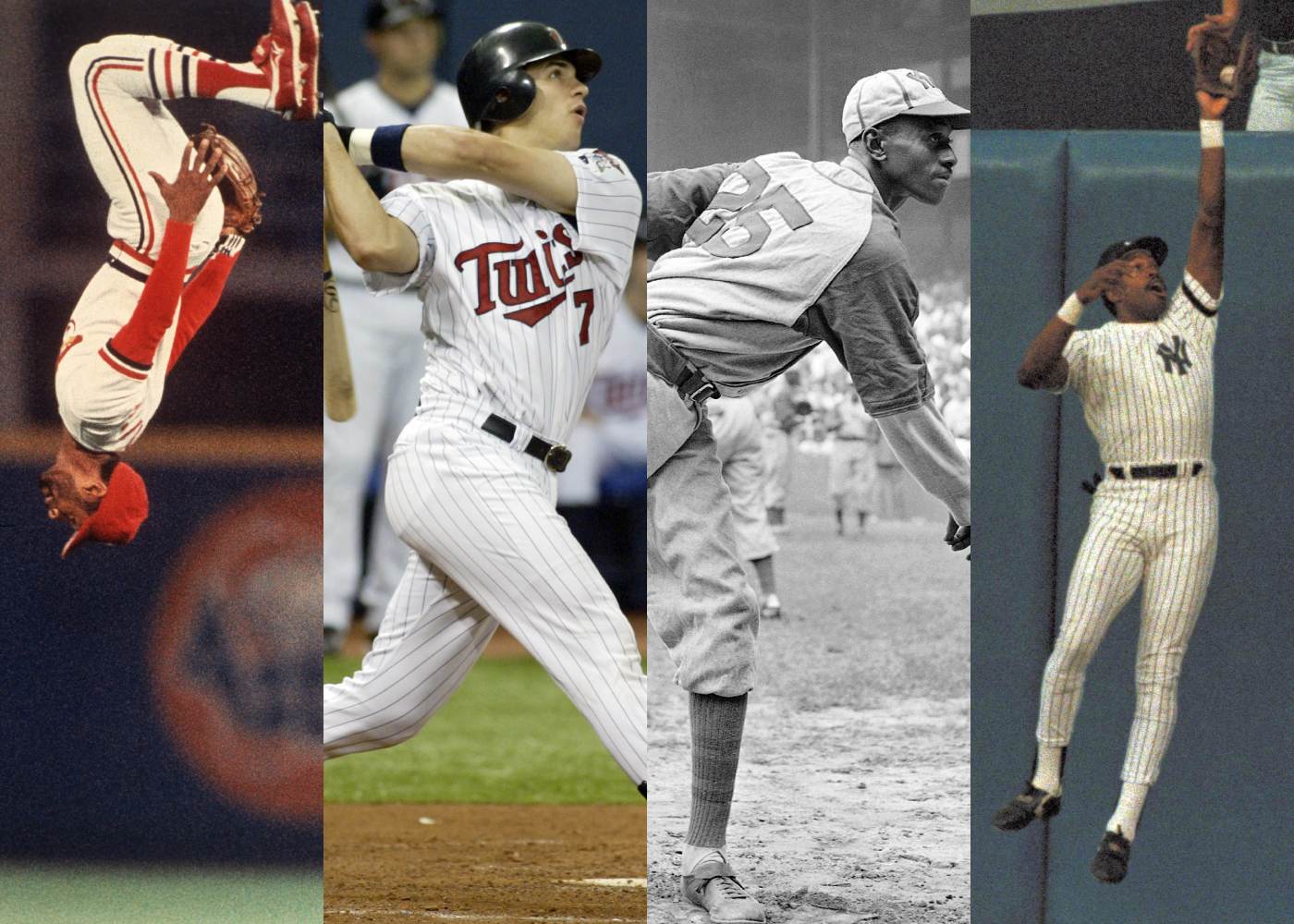
St. Paul vs. Mobile, Alabama — which is the capital for Hall of Famers?
Four hall of famers — Dave Winfield, Paul Molitor, Jack Morris and Joe Mauer — all growing up in a 3½-mile loop of St. Paul.
How remarkable is that? Minneapolis doesn’t have any natives in the Hall. There are entire states with no hall of famers.
Among midsize cities, to find a competitor with St. Paul in quantity of hall of famers, you have to travel all the way to coast of Alabama, in Mobile.
But can even Mobile match St. Paul’s knack for turning out baseball’s greatest? Let’s compare the two cities’ output of hall of famers, in good ol’ head-to-head style, and see who comes out on top.
The power: Willie McCovey vs. Dave Winfield
Left: Willie McCovey in April 1964. (Associated Press)Right: Dave Winfield robs Joe Carter of a home run in April 1986. (Ron Frehm / Associated Press)
St. Paul Central and University of Minnesota grad Winfield matches up better than I thought he would against McCovey, the slugging first baseman from Mobile who formed an unforgettable tandem with Willie Mays (also from Alabama but a little farther up the road) in San Francisco.
McCovey lost some games and at-bats early in his career because the Giants had both him and Orlando Cepeda to play 1B, but “Stretch” still managed to club 521 home runs and lead the league three times. And he hit a lot of those in the unfavorable conditions of Candlestick Park, in an era when offense was down.
But Winfield hit 465 round-trippers of his own, and he has 3,110 hits — nearly a thousand more than McCovey.
McCovey had some years where he was undisputably the best hitter in the NL, which Winfield never really had — and McCovey can count an MVP award. However, he might have traded that for something Winfield got — a key hit to secure a World Series championship. In Game 7 of the 1962 World Series, with the tying and winning runs in scoring position in the bottom of the ninth, McCovey famously scorched a line drive right at Yankees second baseman Bobby Richardson, ending the series and breaking hearts everywhere, including Charlie Brown’s. Winfield, of course, broke out of his career-long postseason funk with the hit that secured a championship for Toronto in Game 6 of the 1992 World Series.
Winfield provided more value on defense — with seven Gold Glove awards and that cannon for an arm — and as a baserunner than McCovey.
As a shortcut, let’s look at wins above replacement: Baseball Reference gives McCovey 64.4, and Winfield 64.2.
It’s probably McCovey, but it’s a lot closer than people think. I’d hate to live on the difference.
The sweet swings: Billy Williams vs. Joe Mauer
Left: Billy Williams in 1969. (Associated Press)Right: Joe Mauer launches his first major-league home run in 2004. (Paul Battaglia / Associated Press)
This contest probably comes down to whether you value longevity or peak value.
But first off, the similarities. Longtime Cubs outfielder Billy Williams, born in the Mobile suburb of Whistler, wasn’t flashy — in fact, his Hall of Fame plaque starts this way: “Soft-spoken, clutch performer was one of the most respected hitters of his day.”
Sound like a certain MVP catcher with sideburns you know?
And both Mauer and Williams had left-handed swings that left youth baseball coaches swooning (believe me on this).
Williams played a few more years, had a few more years as a star, than Mauer did. And he hit with more consistent power. But Mauer took the beatings behind the plate — and played well back there, while Williams had it a little easier as primarily a left fielder — where he was not renowned for his defense.
Are a few more star years from a corner outfielder more valuable than having the best catcher in the league for 10 years?
Most unfortunately, we never got to see what either of these sweet swings would have looked like in a World Series game.
Baseball Reference has Williams at 63.6 wins above replacement and Mauer at 55.2. But Mauer earned 4.8 WAR for every 162 games played, compared to Williams’ 4.1, and that’s counting Mauer’s later years at 1B.
I’m giving this one to Mauer, just barely. We’re all tied up.
The ignitors: Ozzie Smith vs. Paul Molitor
Left: Ozzie Smith does his trademark flip before Game 3 of the 1985 World Series. (AP Photo)Right: Paul Molitor connects for a single at the Metrodome in 1998, tying him with Willie Mays on the all-time hits list. (David Zalubowski / Associated Press)
Talk about taking two different roads to the same place. Mobile’s Ozzie Smith is probably the greatest defensive shortstop in baseball history, and he did it in style, with highlight plays that still make us think the whole thing was done with CGI. The longtime Cardinal turned in years where he was an all-star and legitimate MVP candidate even when he was less than league average at the plate.
Cretin and University of Minnesota grad Molitor, on the other hand, spent a large chunk of his career as a DH after injuries had slowed him, though he wasn’t any liability on defense before then. But Molitor is in Cooperstown for his bat — and the baserunning he did after all those hits — and was an offensive force till nearly the end of his career. Even in his last year with the Twins, he managed to hit .281. Meanwhile, Smith ended his career with a slugging percentage lower than his on-base percentage.
Signature moments? They both have World Series rings (thankfully, Ozzie didn’t get another one in ’87). Smith was a National League Championship Series MVP with an unforgettable homer. But Molitor was a World Series MVP. Molitor has that 39-game hitting streak. But Ozzie was in “The Simpsons.” Hey, Molitor could easily have replaced Steve Sax on Mr. Burns’ team.
What does WAR say? Smith is at 76.9, and Molitor 75.6.
Both are all-time greats. We’re still all tied up.
The aces: Satchel Paige vs. Jack Morris
Left: Kansas City Monarchs pitcher Leroy Satchel Paige warms up at Yankee Stadium on Aug. 2, 1942, before a Negro League game between the Monarchs and the New York Cuban Stars. (/Matty Zimmerman, Associated Press)Right: Jack Morris, leads the charge out of the dugout as the Twins win the World Series in 1991. (Jean Pieri / Pioneer Press)
Satchel Paige, possibly the greatest pitcher in the history of the sport, is an unbeatable entry for Mobile. So who does St. Paul want out there when no one’s giving us a chance? Jack, of course.
Paige was born in Mobile, exact day and year and possibly decade unknown, but probably 1906. He became, alongside Josh Gibson, the biggest star of the Negro Leagues in the 1930s and ‘40s, but he was as charismatic and quotable as Gibson was quiet and unassuming. Paige drew the crowds. He was a star who enjoyed the celebrity, and the stories are endless, like the times he would load the bases and then make the outfielders sit down while he struck out the next three batters.
Ted Williams, Joe DiMaggio and Bob Feller are just three of the many people who called Paige the best pitcher they ever saw.
Morris is credited with 43.5 wins above replacement, to Paige’s 46.9. But there are times when WAR doesn’t tell the full story of a player’s greatness. I think that’s true about Morris. But it’s even more true about Paige.
On my deathbed I’ll still see Morris out on that Metrodome mound slamming his glove with Kent Hrbek after that double play in the eighth inning of Game 7, but even he can’t beat Satchel Paige on this one. Who could?
So it looks like Mobile just squeezes by St. Paul for the victory. Unless there’s a technicality — like the fact that Billy Williams was actually born in Whistler, a suburb of Mobile. So maybe that’s enough to tie it up again and … oh, what’s that you say, Mobile? You have another contender?
Incomparable: Henry Aaron
Milwaukee Braves player Hank Aaron poses for a photo at Ebbets Field in 1954. (Associated Press)
Uh oh. Well, yes, now that you mention it, the Hammer is from Mobile, too. So to Mobile’s ledger you have to add:
3,771 hits (with a career .305 batting average).
Three Gold Gloves (and he was competing for this against Roberto Clemente much of the time)
An MVP and a World Series ring won against the Yankees at the height of their dominance.
6,856 total bases. (Aaron is the all-time leader here, and it’s not close.)
143.1 wins above replacement. (Who can top this? Just Babe Ruth, Walter Johnson, Cy Young, Barry Bonds, Willie Mays and Ty Cobb.)
755 home runs. (Subtract all of Aaron’s home runs from his total hits and he still has 3,016.)
For how great and how famous Henry Aaron is, you rarely hear people claim him as the best ever. His long chase of Ruth’s home run record may have left the impression that he just hung around and compiled stats, or that he was mostly just a slugger. That wasn’t how it was. He was a pure hitter who just happened to hit home runs, a fleet outfielder and baserunner who played great defense and stole bases, and a fierce competitor and respected teammate. And a dominant force for 20 years.
He might have been the best ever.
So you got us this time, Mobile. Next time we’ll challenge Minneapolis.
“From St. Paul to the Hall”: the Pioneer Press chronicled the careers of Dave Winfield, Paul Molitor, Jack Morris and Joe Mauer, and we’ve compiled the best of our coverage into a new hardcover book that celebrates the legendary baseball legacy of Minnesota’s capital city. Order your copy of “From St. Paul to the Hall.”
Related Articles
Joe Mauer’s 2009 season was legendary. Where does it rank among the best ever?
Speech written, Joe Mauer ‘excited, nervous’ for Hall of Fame induction weekend
Twins select shortstop Kaelen Culpepper in first round of draft
Louisville finishes off six-game sweep of Saints
Limping to the break: Twins rally late but fall in first half finale to Giants


